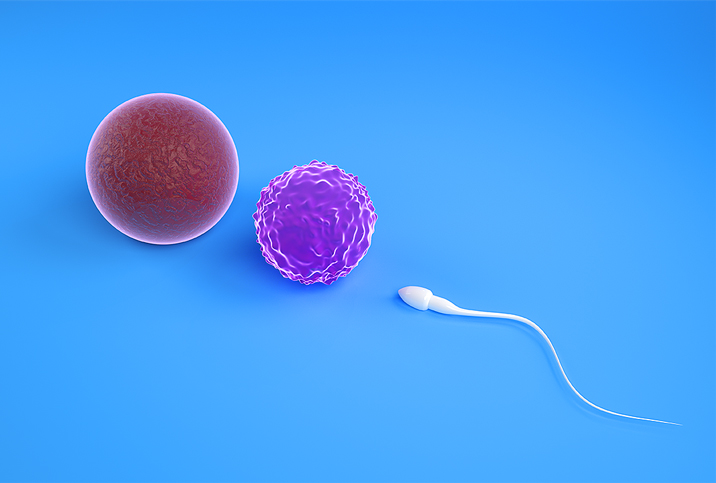How to Cope With Chlamydia Post-Diagnosis

Living with a sexually transmitted disease (STD) brings with it a unique set of challenges. Deciding how to tell your partner (old or new), how to handle your sex life moving forward, and how to take care of yourself during and after treatment are all potential problems that you now have to address.
Thankfully, chlamydia is a very treatable condition, and treatment usually lasts five to 10 days, which means the inconvenience of living with this particular STD shouldn't last long. A chlamydia infection that goes untreated for a long time, however, may produce more lasting effects to address.
Living with chlamydia
As is often the case, treatment for a chlamydia infection is generally resolved in less than two weeks, which means the "living with chlamydia" stage of your life shouldn't be too long. In that time period, however, it's absolutely crucial to take care of yourself and follow all of your doctor's instructions, which may include:
- Finishing your round of antibiotics. It can be tempting to stop taking medication once your symptoms subside, but that's a recipe for disaster (and a never-ending infection). Take your pills as prescribed and don't end the course of antibiotics early.
- Abstaining from sex during treatment. A few weeks may feel like an eternity for people with high libidos, but it's important to wait to have sex until after your infection has been fully treated. "People who are in the process of being treated for chlamydia should abstain from sex until the treatment is over," said Kate Tulenko, M.D., M.P.H., former director of the U.S. government's global health workforce project and current CEO and founder of Corvus Health, based in Alexandria, Virginia. "If not, you risk spreading the infection to your partner."
- Abstaining from sex after treatment. We hate to disappoint you, but you really should wait a full seven days after you finish treatment to have sex again. This ensures the infection is completely cleared up and unable to spread.
- Getting additional testing, if your doctor recommends it. It's common for people with one STD to have a second infection soon after, so your doctor may recommend additional screenings for sexually transmitted infections (STIs).
In general, you should be back to living your regular, infection-free life within a few weeks as long as you follow your doctor's advice and take care of yourself.
Living with chlamydia complications
While chlamydia can typically be easily treated, a person who has an infection that's gone on for too long or suffers from recurrent infections may experience serious and potentially lifelong complications.
If you're suffering from infertility due to chlamydia-caused pelvic inflammatory disease (PID), you have options. Assisted reproductive technology (ART) has come a long way, and people who can't conceive naturally have a wealth of options, such as in vitro fertilization (IVF) and intrauterine insemination (IUI). Surrogacy and adoption are possibilities as well.
In rare cases, untreated or chronic chlamydia can lead to erectile dysfunction (ED). While ED can be demoralizing, treatment is available in the form of medications and therapy. For a lot of men, a wearable device proves helpful. Eddie® is an FDA-registered Class II medical device designed to treat erectile dysfunction and improve male sexual performance. In 2021 clinical trials, Eddie proved effective in treating men with physically, psychologically and pharmacologically induced ED. Of the study participants, 93 percent of men who used Eddie reported a beneficial effect on their sex lives.
Dating while living with chlamydia
If you're sexually active and notice any unusual symptoms, it's time to put a halt to your sex life and alert your doctor.
"If a patient has multiple sex partners or is having sex with some unknown person, they can discuss the situation with a physician and can be tested for chlamydia," said Maneesh Singhal, M.D., an internal medicine specialist in Sonora, California, and a medical consultant at SuperPill, an online pharmacy.
Multiple sex partners can put you at high risk of contracting an STD. So if you're having sex with more than one person and get diagnosed with chlamydia, you need to fill everyone in on the situation.
Yes, it can feel awkward to tell someone you have an infection, but remember, STDs are very common and there should be no stigma in getting diagnosed. In fact, getting diagnosed means you got tested, which is a sign you're taking your sexual health seriously.
"It is recommended that until an infection is cured, patients should avoid intercourse or any kind of sexual activity," Singhal said.
"Any kind of sexual activity" includes vaginal, oral, anal and manual sex.
"If someone is already diagnosed with a chlamydia infection, they should honestly tell their partner that they are positive for chlamydia and they're on active treatment," he advised.
Honesty is best, even when that's a difficult route to take, but the only way to deal with this issue is for your partner(s) to also be screened if you test positive.
While waiting on sex can be difficult, now is a good time to try to build intimacy aside from sexual activity. Focus on cuddling, talking about desires and complimenting each other. All of the buildup will likely make sex better once both of you are cleared to engage.
Prevention and aftercare
Preventing chlamydia and other infections begins with safer sex. This means wearing a condom every time, especially when having sex with new people, multiple partners or someone who has multiple partners themselves.
It's important to get regular testing. Most STIs and STDs clear quickly with antibiotics, so getting diagnosed regularly is necessary so you can be prescribed the medicines you need.
As far as aftercare goes, it's mostly about preventing recurrent infection. Recurrent infections put you at risk for serious complications, such as PID, infertility, erectile dysfunction and more.
Resources for patients and caregivers
If you or someone you know and love is suffering from chlamydia, you're not alone. There were 1,628,397 cases of chlamydia reported in 2021, according to the Centers for Disease Control and Prevention (CDC). It's true that stigma still exists in our society about any infection or disease that's sexually transmitted, but it's really nothing to be ashamed of and the emphasis should be on prevention and regular testing.
Talk to your partner(s) about your infection and share any emotions you're feeling about getting diagnosed. If your mental health is suffering post-diagnosis, talk to a therapist. Online therapy is available and accessible if you need someone to talk to sooner rather than later. Video visits have become a viable option for most people, and more physicians and therapists have added them as a service. Giddy telehealth makes it easy to get connected to a qualified healthcare professional who can help with a variety of conditions.
Lastly, an important part of maintaining good sexual health is keeping yourself informed with regular testing and up-to-date information. Finding accurate information can sometimes be overwhelming and difficult to locate, so here are some resources to bookmark:
- Centers for Disease Control and Prevention. The CDC publishes yearly reports about sexually transmitted infections, case rates and other statistics. You can also find detailed information about symptoms, diagnosis and treatment for every kind of STD and STI.
- Planned Parenthood. This organization provides low-cost and free STD/STI screenings across the United States. If you're worried about affording regular testing, call your local Planned Parenthood for more information. It also often provides low-cost or free protection, such as condoms.
- American Sexual Health Association (ASHA). ASHA is a nonprofit organization that provides stigma-free information about sexual health and offers support groups for individuals suffering from sexually transmitted diseases.
- Giddy. At Giddy, we take your sexual health seriously. Our large library of articles covers all the information about STDs and STIs you need to keep yourself informed.


















